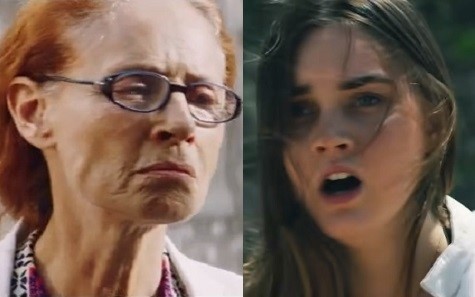Movies talk to each other. What did the films of 2020 have to say? This is a look at how two movies from the past year tackle similar subjects in different ways. Be warned: SPOILERS for The Beach House and Bacurau follow.
The story of 2020: A healthy organism is invaded. Was it that healthy to begin with, though? Maybe the invasion is unstoppable. Or maybe the organism is stronger than the sum of its parts.
Jeffrey A. Brown’s sci-fi horror indie The Beach House might have been a theatrical sleeper, had theaters been around when it opened. Even in March, COVID-19 had provided a strong enough parallel to the movie’s story of infection to make it, as the cliche goes, “eerily prescient,” while also destroying the environment it could have flourished in. Environmental destruction is the movie’s subject, as a group of people gathered at said Cape Cod domicile observe (while under the trippy influence of edibles) a weird fog cover the coast, and then one by one fall prey to the uncanny and destructive oceanic life forms that wash ashore, presumably to take over the world by breaking down one body at a time.
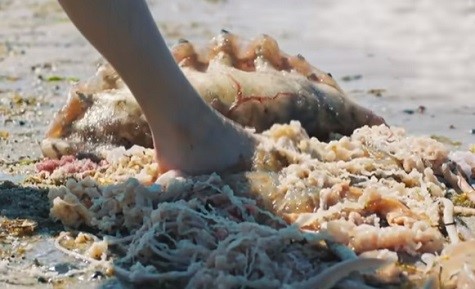
The breakdowns are seeded early, though. Two couples are occupying the house, each thinking they would have the place to themselves. One pair is a middle-aged husband caring for his terminally ill wife, their partnership is coming to an end despite their best intentions. On the other end of the spectrum, driven grad student Emily and feckless dipshit boyfriend Randall (whose family owns the house) are clearly headed toward an ending that neither is ready to recognize. They’re moving in different directions and in a non-apocalyptic world, that would just be fodder for some tears before moving on. All four of them can exist together, if a bit uncomfortably before the edibles come out, but they cannot hold up under stress.
Brown is not making a cheap metaphor here – he is fully invested in the inhuman implications of his story, the worms that burrow into his characters’ flesh and literally dissolve them into mush (a la Sen. Bigot, R-X-Men 2) are presumably doing this to everyone, regardless of relationship status, and for no reason other than a few chemicals aligned differently after a few billion years. Last time this happened we got oxygen and the anaerobic world was destroyed, maybe the pendulum has swung back the other way. But he also doesn’t deny the horror of both bodies and the connections between them being dissolved. Emily tries to help others and hold onto Randall as long as she can, despite clear signs that it’s already too late. Only when the connection to them, and apparently all other humans, has been severed does she finally submit to the inevitable and dissolves into the new world order.
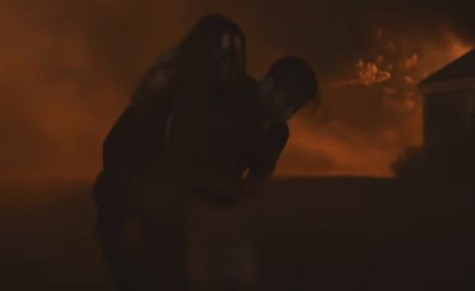
Bacurau begins outside of the titular remote Brazilian village, as a native daughter returns along with a battered water truck. She’s coming back because the town’s matriarch has died and during the funeral the town doctor, who clearly had a complicated relationship with the deceased, drunkenly lashes out at everyone around her. Other villagers include a hit man whose assassinations are all over YouTube, another outlaw is spoken of on the outskirts of town. It would seem that there are many possibilities for conflict here, for breakdown.
Shortly after the funeral, during the town’s semi-regular gathering to spread news and pass out necessities, the doctor (the great Sonia Braga) stands up and apologizes for her actions at the funeral. She’s embarrassed for her behavior and the townspeople are a bit embarrassed on her behalf, but it’s something that needs to happen and does, and is over with. She and her community have re-established themselves.
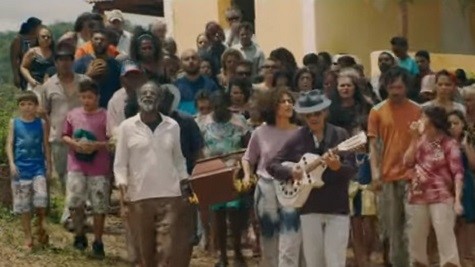
The town of Bacurau seems to be a place where nothing really happens and where certain things are constant – the enjoyment of the DJ spinning songs, the business of madam running the brothel, the utter loathing for the politician who comes by looking for support and making veiled threats if he doesn’t get it – but it fluxes and flexes as it needs to in the long buildup of the movie’s first hour and change. Writer/directors Kleber Mendonça Filho and Juliano Dornelles slowly immerse the viewer in this world while never quite settling on a mood, mixing local bangers with a lost John Carpenter instrumental on the soundtrack. And they keep throwing exterior elements into the mix – a creepy drone, a shutdown of first the town’s water and then its existence on satellite maps, an American couple on motorbikes that seem to be doing more than just passing through.
It turns out that sleazy politician is colluding with mostly American mercenaries looking for a Most Dangerous Game situation for funsies. He’ll eliminate an obnoxious (and resource-controlling) constituency while they get to play their game. These mercenaries are perfectly cast obnoxious American randos, they all feel like third-rate soap opera villains who went through a two-week boot camp and feel like badasses, and they’re led by Udo Kier, who is at least a professional sleaze merchant and is disdainful of these amateurs. They start killing their way into the village, men, women and children all get taken out. The invasion is on.
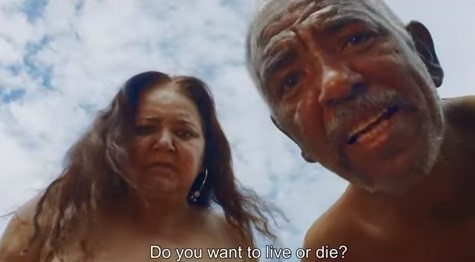
The Carpenter track is deployed perfectly, but Fiho and Dornelles are not using the master as a reference here — this is not Assault on Precinct 13, with people thrown together taking a stand, or The Thing, with people working together falling apart. The community recognizes what is happening and responds. Preparations are made, that outlaw is reminded of where he comes from. Everyone has a role to play. The most brutal ownage comes as two mercs slowly, gleefully stalk two naked old people, who get up, get high and then blow the invaders apart with a blunderbuss. One is taken alive to Braga and we don’t see her again. We do see Braga, white coat covered in blood, staring down Kier with some ownage of her own: “We have all taken a powerful psychotropic drug and now you are going to die.”
This happens in short, arguably too short, order. But the matter-of-fact nature of the town dispatching its enemies carries its own charge. It’s the ruthlessness of survival, the inversion of The Beach House’s invasion. Evolution is not a straight line of destruction, a new thing does not mean the eradication of the old. Bacurau is Portuguese for “nightjar,” a type of bird, and birds used to be dinosaurs. Dinosaurs are gone, but the birds are still around, flocking together.

